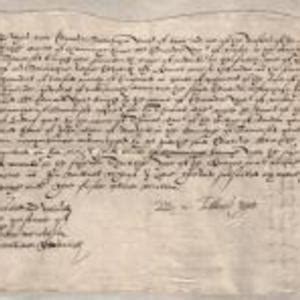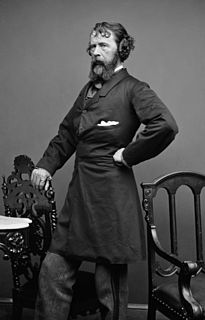A Quote by Edward Dyer
O liberty, Parent of happiness, celestial born When the first man became a living soul; His sacred genius thou.
Related Quotes
Until, modern times when it became mostly a civic task, education was considered a sacred work. It was sacred because it involved the indwelling spirit in the student and because it required an awakened spirit in the teachers. Spirit to spirit, genius to genius, soul to soul go the true lessons that help young people become themselves. Ultimately, each person holds the key to the story trying to be lived from within, but first someone else must help unlock the mystery of one’s life.
It is not the right of property which is protected, but the right to property. Property, per se, has no rights; but the individual - the man - has three great rights, equally sacred from arbitrary interference: the right to his life, the right to his liberty, the right to his property The three rights are so bound together as to be essentially one right. To give a man his life but to deny him his liberty, is to take from him all that makes his life worth living. To give him his liberty but take from him the property which is the fruit and badge of his liberty is to still leave him a slave.
Dost thou understand me, sinful soul? He wrestled with justice, that thou mightest have rest; He wept and mourned, that thou mightest laugh and rejoice; He was betrayed, that thou mightest go free; was apprehended, that thou mightest escape; He was condemned, that thou mightest be justified; and was killed, that thou mightest live; He wore a crown of thorns, that thou mightest wear a crown of glory; and was nailed to the cross, with His arms wide open, to show with what freeness all His merits shall be bestowed on the coming soul; and how heartily He will receive it into His bosom?
It is quite useless to declare that all men are born free if you deny that they are born good . Guarantee a man's goodness and his liberty will take care of itself. To guarantee his freedom on condition that you approve of his moral character is formally to abolish all freedom whatsoever, as every man's liberty is at the mercy of a moral indictment which any fool can trump up against everyone who violates custom, whether as a prophet or as a rascal.
The impious soul, however, punishes itself by seeking a human body to enter into, for no other body can receive a human soul; it cannot enter the body of an animal devoid of reason. Divine law preserves the human soul from such infamy... The soul passeth from form to form; and the mansions of her pilgrimage are manifold. Thou puttest off thy bodies as raiment; and as vesture dost thou fold them up. Thou art from old, O Soul of Man; yea, thou art from everlasting.
The wisdom of the Lord is infinite as are also His glory and His power. Ye heavens, sing His praises; sun, moon, and planets, glorify Him in your ineffable language! Praise Him, celestial harmonies, and all ye who can comprehend them! And thou, my soul, praise thy Creator! It is by Him and in Him that all exist.
But Goethe tells us in his greatest poem that Faust lost the liberty of his soul when he said to the passing moment: "Stay, thou art so fair." And our liberty, too, is endangered if we pause for the passing moment, if we rest on our achievements, if we resist the pace of progress. Change is the law of life. And those who look only to the past are certain to miss the future.
In here, the human bosom -- mine, yours, everybody's -- there isn't just one soul. There's a lot of souls. But there are two main ones, the real soul and a pretender soul. Now! Every man realizes that he has to love something or somebody. He feels that he must go outward. 'If thou canst not love, what art thou?' Are you with me?
The perfection of His relation to us swallows up all our imperfections, all our defeats, all our evils; for our childhood is born of His fatherhood. That man is perfect in faith who can come to God in the utter dearth of his feelings and his desires, without a glow or an aspiration, with the weight of low thoughts, failures, neglects, and wandering forgetfulness, and say to Him, “Thou art my refuge, because Thou art my home”.





































